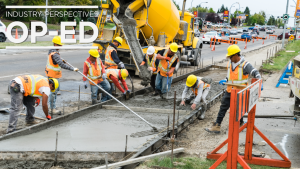A report published recently by the MacDonald-Laurier Institute says the Alberta government needs to make some “important and sometimes challenging” decisions so the province can take full advantage of future economic opportunities.
“In this decade, Alberta will need to confront many new realities to maintain its high standard of living,” say report authors Janice MacKinnon, a former Saskatchewan finance minister, and Jack Mintz, the president’s fellow of the school of public policy at the University of Calgary.
“The fiscal decisions that the provincial government makes in the next several years will have a significant impact on Alberta’s prosperity in decades to come.”
The report, Alberta 2023 and Beyond/Fiscal Policy, Health Care and Federal-Provincial Relations, has some interesting points for the construction industry to consider.
If acted upon, many of the report’s recommendations could affect how Alberta’s public services are delivered, including the physical facilities where they are provided.
MacKinnon and Mintz say Alberta needs to take advantage of having the youngest population in Canada by encouraging more young people to remain in the province for post-secondary education and skills training.
The number of Albertans aged 18 to 24 is expected to increase by one-third over the next decade. The report’s authors say the Alberta government must act quickly to take advantage of the projected 100,000 increase in this age group.
The 2022 provincial budget allocated $171 million over three years to
increase enrolment in technology, agriculture, financial services and aviation.
“However, the province needs to do more: The post-secondary institutions receiving the additional funding should be required to develop strategies to recruit more Alberta and non-resident students.”
MacKinnon and Mintz say post-secondary institutions are critical not only for training students for the workforce, but also for undertaking research that contributes to an innovative regional economy.
Alberta 2023 and Beyond also covers what it calls the Alberta labour market’s multi-faceted challenges.
The authors say the province must address its high personal income tax rates.
They discourage work effort, investment and risk-taking, all of which are important, because the province’s economy relies on entrepreneurship and skilled labour.
“Alberta has a problem with tax competitiveness,” says Mintz. “The province has been losing too many high-income taxpayers.”
More needs to be done to improve basic literacy and numeracy skills that are necessary in a changing workplace.
In particular, the K-12 curriculum needs to upgrade the mathematical skills of students.
MacKinnon and Mintz say Alberta has a skilled labour shortage, which the province needs to address by doing more to encourage in-migration from other parts of Canada.
For example, by recognizing the credentials of workers trained in other provinces, it will reduce some of the barriers to entry to its labour force.
The province must also encourage underrepresented groups and people who have been unemployed for a long time to get into the job market.
“Both those underrepresented in the workforce and the long-term unemployed have the potential to contribute to the economy and it is worth investing in programs targeted to their specific needs.”
Regarding health care, Alberta 2023 and Beyond proposes revamping seniors care by moving more procedures to clinics and encouraging more virtual care.
The government should continue to outsource non-clinical support services, following the examples of such provinces as Ontario and British Columbia, which outsourced their food services to third-party vendors.
MacKinnon and Mintz cite an Ontario Medical Association report that argued for moving some surgeries out of hospitals.
The Alberta government has set targets to increase non-hospital surgical facilities by 30 percent by 2022-23.
Trevor Tombe, professor of economics at the University of Calgary, says Alberta 2023 and Beyond is not only an accurate picture of where the economy is now, but also a document full of good advice.
“They recognize the necessity of making trade-offs in public policy,” says Tombe. “The recommendations are good. Some of them challenge the thinking of the right, and some the thinking of the left. That shows the report is not one-sided.”
Aaron Wudrick, director of the domestic policy program at the Macdonald-Laurier Institute, says, “In spite of the challenges it has faced in recent years, Alberta remains Canada’s most prosperous province by most economic measures.
“No matter who wins the provincial election this year (May 29, 2023), the next government will need to think carefully about how to maintain that prosperity, and this report provides an excellent framework.”
To read the report click here.











Recent Comments
comments for this post are closed